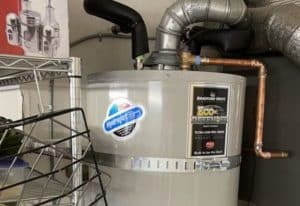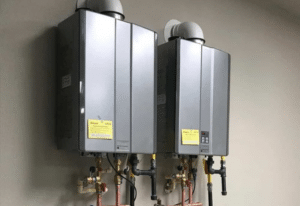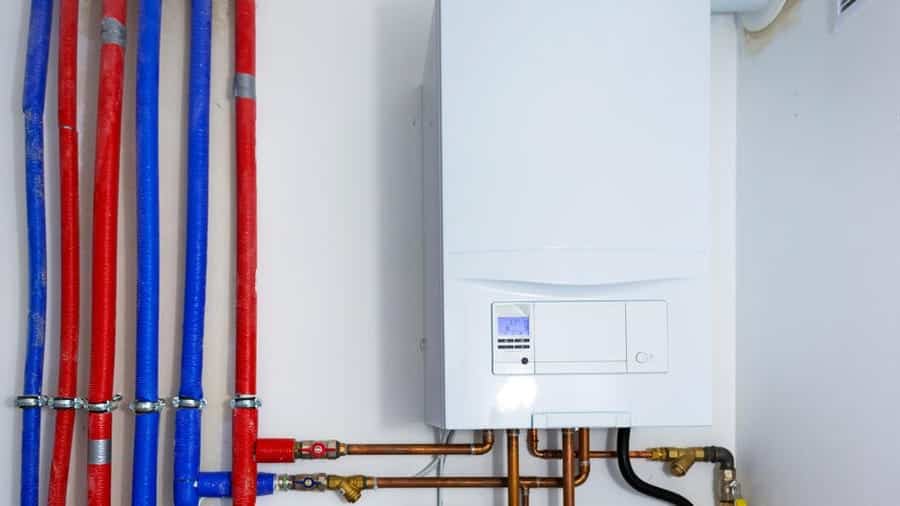
What is the consumption rate of a tankless water heater when it’s connected to propane? Naturally, you run into this question when your tankless water heater is fueled with propane. You hear about how expensive tankless water is all the time. That’s why it’s critical to calculate propane usage regularly.
The average output of a tankless water heater burning propane is 40,000 BTU per hour or 1.5 gallons per day. Propane is an energy-efficient fuel gas well-known for its energy savings potential. Calculating your propane usage can help you understand and evaluate your annual energy consumption.
According to the Energy Star program, a tankless water heater standard annual usage is 200 gallons. That’s approximately $482 per year. The cost of operating a propane tankless water heater varies considerably depending on where you live. In the US, propane is measured in gallons and liters everywhere else. But in this post, we’ll use gallons instead of liters because that makes more sense. So how many gallons will you need?
If your family consists of 2 people, you’ll only need 15 gallons. 25 for 3-4 members, and 35-40 if there are more than 5 of you.
The location’s temperature, water quality, and tankless water heater maintenance are all factors in this calculation. Start by learning about your tankless water heater capabilities. A gallon of propane costs a mere $2.20. So based on the cost, you can conclude that a family of two will require 33$ each month.
A household with three to four people will need to spend $55 monthly, while a home with more than five members will have to pay between $77 and $88 per month.
The size of the heater and the sort of heater (expensive or inexpensive) influence things like: how much propane does a tankless water heater use? And how much is required to heat a given space. If you have a large, pricey heater, you’ll need more propane than a tiny, cheap one. The effectiveness of the heater also has an impact on how much propane is needed. More efficient tankless water heaters use less propane than less efficient ones. Finally, the temperature outside also affects how much propane is required to heat a specific area. If it’s cold outside, you’ll need additional propane than if the weather is warm.
Tankless water heaters provide consistent, hot water on-demand and cost less to operate than traditional gas tank models. Of the many fuel options available, propane is the most energy efficient one.
How much hot water you use depends mainly on your family’s size and usage patterns. Monitoring your tankless heater’s activity will help ensure everyone in your household always has enough hot water when needed – something that’s especially important in more prominent families.
With this simple approach, you can estimate your monthly propane usage easily. The average cost of a gallon of propane gas is between 2 and 2.75 dollars. Depending on the simultaneous activities in the household, annual propane consumption for the whole family might cost up to 100 dollars or more each year. You may choose to create a budget plan for your propane expenditures by keeping track of your monthly usage habit. Collecting this data may help you calculate your overall propane spending.
Water is so hard to heat up due to its high specific heat (4.19 kJ/kg°C). With a propane tank heater, you can heat more than 10+ GPM of water in less than 15 seconds. However, this requires a lot of energy from burning propane.
To figure out the question:how much propane does a tankless water heater use and how much these on-demand tankless water heaters use to heat water, we must first calculate the energy density of propane. We once again turn to the US Energy Information Administration and find out that the energy value for a gallon of propane is 91,452 BTU. Burning a gallon of gas generates 91,452 BTU (at 100% efficiency).
Rinnai, which produces the best propane tankless water heaters on the market, offers units that range from 5.3 GPM to 11 GPM. The 5.3 GPM unit produces a 53,000 BTU heating output at 100% capacity, while the 11 GPM one produces a 199,000 BTU heating output at 100%.
Let’s take the giant residential propane tankless heater as an example. It being an 11 GPM Rinnai RU199iP; this ‘199’ in the model number indicates that this propane tankless heater generates 199,000 BTU/hr when operating at total capacity.

We know that such a device will generate 199,000 BTU of heating output by burning propane. We also understand that utilizing 1 gallon of propane creates 91,452 BTU of heat. With this information, we can determine how much propane is consumed each hour by a sizable tankless propane heater. Here’s the formula:
Propane Used In 1 Hour = 199,000 BTU (Heater Capacity) / 91,452 BTU per gallon = 2.18 Gallons of Propane
The amount of time it takes for a propane tankless water heater to run out of gas completely can be determined by dividing the gallons burned per hour (at 100% output) by 2.18. We may also compute how much it costs to operate such a propane heater per hour simply by multiplying the propane consumption and cost per gallon ($2.41 is the regular natural average). Here’s how we arrive at that conclusion:
Running Cost Per Hour = 2.18 gall/h (Propane usage) × $2.41/gall (Propane cost) = $5.25/h
You can redo these calculations for any tankless propane water heater. Of course, we must also consider that propane does not burn 100 per cent effectively. The EF (Efficiency Factor) of the individual heater significantly impacts burning efficiency.
The amount of propane required to run your water heater varies over time, and the longer you use it, the more propane it will require. Furthermore, different home activities need varying amounts of it. The hours will show you which household chores use up the most propane in your tankless system. For example, you may take a 10-hour shower or longer but need more propane to be as hot as the first 10-minute shower in the morning. Several fixture types’ GPMs determine the quantity of gas consumed.
Although propane does lower your family’s energy costs, you must examine its efficiency as a whole. The first inspection should be of your location. Always think about where you live, about how much time it will take to heat water — and thus how much propane you’ll need for your indoor water use. For example, if you reside in a colder northern region, it takes significantly more time to heat water than in the south. Consequently, this would require more propane usage overall.
The typical groundwater temperature in your area might be 52 degrees Fahrenheit. In this case, you need a water heater that can heat the water by 53 degrees Fahrenheit at 5 gallons per minute (GPM) to have well-heated domestic water. Always remember that colder incoming water absorbs more heat. So, if you live in a colder climate, you would probably need a cold-weather-ready water heater. In addition, the ambient temperature usually has a significant effect on how much propane burns.
You must invest in a water softener if your home has hard water. Softer water helps save more propane.

Expect a smaller bill for firms with fewer people. A family of two consumes approximately 15 gallons each month, whereas a family of 5-6 uses about 40 to 50 gallons per month. Different household members have varying requirements. This factor alone adds significantly to the total amount of propane consumed. As a result, it’s essential to consider it because every household has its own lifestyle.
The BTUs and flow rates of an electricity-efficient tankless water heater differ. The first thing to consider is the BTU rating, it will show how much propane is used per hour. The other crucial element is flow rate. When converting heated water, if your model has a larger gallon capacity, it will work more effectively owing to its greater volume.
High-capacity systems can heat more water than low-capacity units using the same amount of energy in less time. In other words, the higher the GPM capacity, the lower the propane consumption.
The minimum cost of a gallon of propane is only $2.00, yet your monthly expenditures will vary case by case. Because at one point I lived with my mother, I know we would need to spend 33 dollars per month on propane. That’s around 16 and a half dollars per person for propane. Compared to extended families, our propane budget is smaller and more cost-effective. If you have a family of 5 or more, expect to spend approximately $100 monthly.
The amount of propane consumed by each family depends on how they manage their water heating demands. The more we use our water heater daily, the more gas is used.
If you feel your water heater can serve you for a couple more years just fine, purchasing a new one may be overkill. Instead, you can do a few things to improve your water heater’s efficiency and save money on propane.
As previously mentioned, a build-up of sediment might put a damper on the operation of your water heater. As a result, We recommend flushing your water heater once every year or two, depending on your water source. Because minerals like calcium and magnesium become tiny bits of silt when the water is heated, healthy water must be flushed twice a year to make sure the heater does not fail.
It’s crucial to keep up with maintenance. You can avoid costly repairs or replacements by ensuring all the working parts of your water heater stay in good condition. Plus, keeping things running smoothly and efficiently will save you money on propane costs. If you’re unsure about what needs to be done, check the owner’s manual for guidance. You can also have a professional plumber take a look if you think something isn’t working the way it’s supposed to.
You can also insulate your forty-gallon water heater to preserve heat and improve performance. As previously mentioned, newer water heaters are built to prevent standing heat loss (the heat it loses while being dormant). However, regardless of whether you have a recent design or not, any water heater may be improved by using an insulating jacket to retain heat.
An easy way to reduce propane usage for your water heater is by reducing how often you use hot water. When you aren’t using the hot water as frequently, there’s no need to replenish the tank as constantly, and therefore less propane will be used overall.
Small changes, like using the cold water option on your washing machine, only washing complete loads, and ensuring that the dishwasher is full before starting it up can make all the difference. These modest adjustments increase and decrease how often and much hot water is required to run a home.
If your appliances are old and use hot water, an excellent way to reduce the amount of propane your water heater uses is by updating those appliances. Today, manufacturers are trying to provide more energy-saving products for consumers because it’s eco-friendly.
Because of this competition, you can find products that save you money in the long term due to their energy efficiency – just like buying a new water heater lowers your propane cost. In other words, investing in less expensive but quality items upfront means saving money down the line.
There are a few things to consider regarding tankless water heater installation in Sacramento. If you use more than two to three hundred gallons of propane per year with a forty-gallon tank, it may be time for a maintenance check on the unit. Propane costs change frequently, and conserving gas and saving a few cents can make all the difference. And you already know the answer to the question: how much propane does a tankless water heater use.
Mike Joshua, a 33-year-old plumber based in California. With a passion for solving complex problems and a commitment to his trade, Mike has dedicated the past 8 years of his life to honing his skills as a professional plumber. After completing technical college Mike quickly secured a job in a plumbing company and has been working steadily ever since. Mike's experience includes not only households but industrial gas and plumbing systems and installation, repair the equipment for different types of business He is known for his attention to detail, strong work ethic, and ability to complete projects on time and within budget. He is always striving to improve his skills and stay up-to-date with the latest industry developments and advancements. In conclusion, Mike enjoys outdoor activities such as hiking and camping. He also has a passion for DIY projects around the home and is always looking for new challenges to tackle.


I didn’t realize how much the usage can vary depending on factors like the size of the unit, household demand, and temperature settings. The example calculations made it easier to understand how much propane you might actually need per month. It’s also good to know that tankless water heaters are generally more efficient, which can help offset propane costs.
As a recent convert to tankless water heating, I found this article incredibly helpful in understanding propane consumption. I switched from a traditional tank heater last winter, and was initially concerned about propane usage. The article’s breakdown of BTU ratings and their correlation to propane consumption finally helped me make sense of my monthly fuel bills.
I particularly like how the author included real-world examples comparing different household sizes and usage patterns. In my case, their estimate of 1.5-2 gallons of propane per day for a family of four was spot-on. The seasonal usage variations section was eye-opening too – I hadn’t considered how groundwater temperature affects propane consumption.
However, I think they could have elaborated more on efficiency ratings and their impact on fuel use. My unit is 95% efficient, and I’ve noticed significantly lower propane usage than what’s mentioned in some of their examples. Still, the tips for reducing consumption through proper maintenance and temperature settings are solid advice that I’ve already put into practice.
A must-read for anyone considering the switch to propane tankless water heating or trying to optimize their existing system.